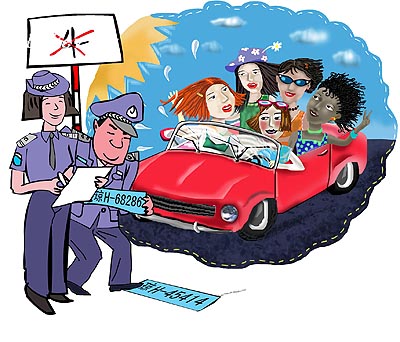
Traffic authorities in Haikou, capital of China's southernmost island province of Hainan, have removed the number "four" from all its vehicle number plates, as four, a Chinese homonym of death, is considered bad luck by most local residents. New measures, effective on August 6, allow car buyers in Haikou to choose their registration plate numbers from 10 pre-fixed combinations randomly displayed on the computer program, where the number four is omitted. The move was aimed at improving number allocation efficiency and conformed to wishes of the people, as many car buyers would rather wait for days to avoid a four in their number plates, said police sources.
The police revealed that, after the fours were scrapped, more than 100 new cars are being registered daily, a 20 percent increase from the daily maximum of 80 cars in the past. It's not a blanket exclusion. The police have preserved some number plates with four to satisfy the needs of those who do want the number.
There is a feeling, however, that without the fours, the number pool might soon fall short of the rapidly growing number of cars on Haikou's roads. But according to local traffic authorities, at least 40 million number combinations will be available despite the exclusion of the fours so it won't exhaust the pool. Some are afraid that the official action to exclude the fours may strengthen the public's attitude toward numbers and spread superstition. To counter this accusation and prove that the government does not subscribe to superstition, the local police have revealed that city police cars and government cars still keep four in their number plates.
Haikou is not the first city to eliminate four from vehicle number plates. Shenzhen, the financial powerhouse in southern Guangdong Province, stopped issuing new number plates with four in 2004. Every year, Guangzhou auctions plates with the "lucky numbers" of six and eight (both are considered to bring fortune by Chinese), for as much as 200,000 yuan each, about the price of a Honda Accord in China.
Get priorities right
Ren Mengshan (Xiaoxiang Morning Herald): Because it is a homonym of "death" in Chinese, four is demonized repeatedly in daily life. It is already a symbol and omen of misfortune. As a result, it becomes the most avoided number among the Chinese. Despite the fact that people would naturally avoid any association with death in their daily lives, most people do understand that the association of the number four with death has no foundation and is merely a local custom.
However, if government departments begin to "demonize" numbers, it takes on an official stamp of approval in a sense. It seems ridiculous. Numbers indicate only quantity and information, so they mean neither evil nor fortunate. It is human beings who have added meanings to numbers. When it comes to Haikou's traffic authorities' actions of scrapping vehicle number plates with four, they are actually accepting the deathly connection the number is said to have. Why are the police entitled to cancel the public's right of choosing number plates-in some cases people like the number as it sounds exactly the same as the Chinese word for fortune. Are there any legal procedures to this number selection? The public prejudice against number four is groundless, and the government should not back such superstitious ideas.
Kuang Shengyuan (Oriental Morning Post): Government departments do need to take into account local customs when working out policies and regulations, but not all customs and habits should receive respect. Only those healthy and helpful habits and customs need to be protected and cherished. To see four as an unlucky number smacks of superstition and is ludicrous. If the government continues on its path to eliminate a number because of respect for local customs, superstitions reflected in the form of local customs may become more widely followed.
Moreover, the elimination of all number plates containing four will inevitably lead to the waste of resources. Vehicle number plates are national resources and there are explicit regulations in law on how to deal with these plates. To eliminate the number four without permission of relevant departments seem improper.
Zhou Zhikun (Nanfang Daily): When Haikou's traffic authorities decided to scrap the number four, did they consult locals or were there any hearings? If not, the action is unreasonable and without necessary
| 